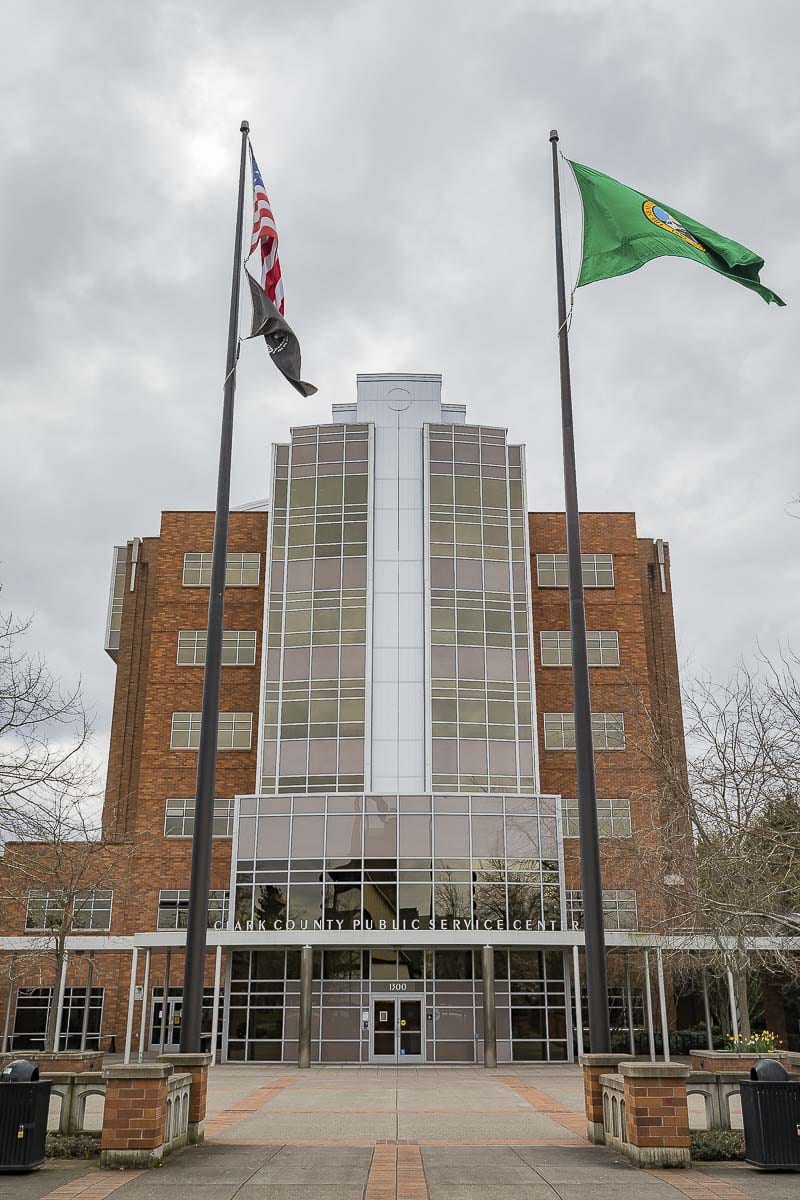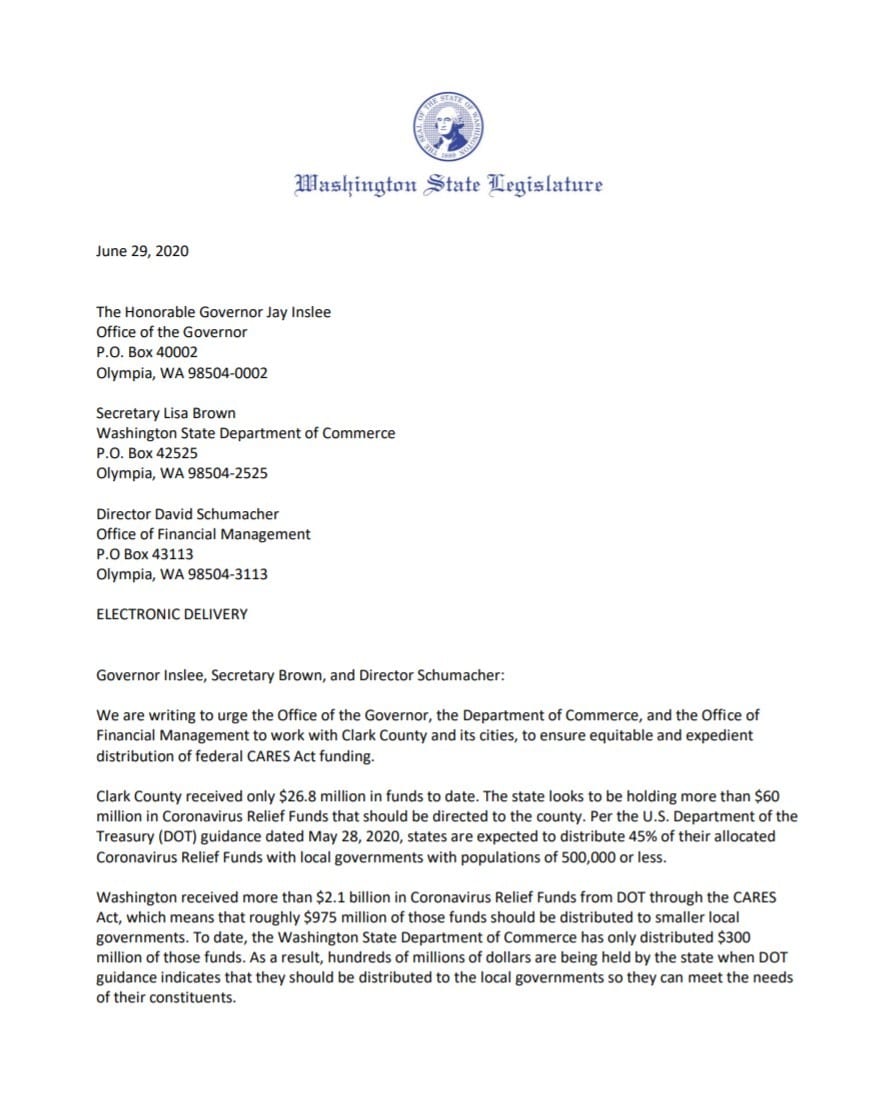Local lawmakers have alleged the state sent out less than a third of the amount required
CLARK COUNTY — The office of Gov. Jay Inslee says it plans to release more information “early next week” regarding the distribution of CARES Act funding.
That statement comes two days after 17th District Rep. Vicki Kraft (R-Vancouver) sent a letter to Inslee’s office, along with the heads of the Department of Commerce and Financial Management, urging them to “work with Clark County and its cities to ensure equitable and expedient distribution of federal CARES Act funding.”

Kraft’s letter, which was signed by Sen. Lynda Wilson, as well as Reps. Paul Harris, Brandon Vick, and Larry Hoff, follows up one sent by the Clark County Council last month, alleging that the state had failed to distribute more than $950 million of the $2.1 billion received from the federal government as part of the stimulus package approved in March.
“As a result, hundreds of millions of dollars are being held by the state when DOT (Department of Treasury) guidance indicates that they should be distributed to the local governments,” Kraft wrote, “so they can meet the needs of their constituents.”
“To me, the state isn’t doing its responsibility to get this money out to our local governments,” Kraft told Clark County Today prior to sending out her letter. “Especially here in Clark County.”
The allegations that the state’s Office of Financial Management (OFM) was withholding funding from local governments first came in a letter from the Clark County Council dated June 11, which pointed out that Spokane County, with a population 7.2 percent larger than Clark County’s, had received more than three times as much in CARES Act dollars.
Under the federal stimulus package, counties and cities with more than 500,000 residents could apply directly for funding. The rest would go to the state, with directives that it be distributed to smaller local governments using the same per capita formula.
If that had happened, Clark County Finance Director Mark Gassaway noted, the county and the cities in it would have received an additional $79.4 million on top of what the state distributed.
“We had a conversation with the Office of Financial Management and asked the question, ‘who made this decision and why?’” Gassaway told Clark County Today. “And, basically it was a lot of hemming and hawing, and no direct answer.”
That answer may come early next week, according to Casey Katims, the governor’s director of federal and inter-state affairs.
“We have been working around the clock since the bill was passed to make sure that Washington is able to take advantage of the critical funds that are provided to us,” Katims told Clark County Today on Thursday, “and ensure that we are addressing the scale with the speed and efficacy that it requires.”
With rolling unpaid furlough days happening throughout state government, Katims said Office of Financial Management employees were off today, and tomorrow is a state and federal holiday, so the soonest they could release updated guidelines was early next week.
Katims called the CARES Act a “sweeping package” that “came together quickly,” leaving a lot of “ambiguities” that required additional attention from their federal partners and state staff to “fully unpack.”
“The bill provided explicit distributions to state government and to local governments with populations above 500,000, but it largely left out small local governments,” Katims said. “So we took really seriously our responsibility to help make sure that local governments of all sizes in Washington were able to reap the benefits.”

While Katims wouldn’t say whether local governments such as Clark County could expect to hear next week that the state is sending more money their way, he did admit that they’re aware the distributed amount isn’t sufficient.
“We know that, no matter what, state and local governments in Washington and across the country, need more support than what they got in the CARES Act,” says Katiims. “The governor has joined with the governors and legislative leaders of Oregon and California in calling on Congress to provide an additional trillion dollars in state and local aide that would be immediate and flexible.”
Katims said the governor has spoken out in support of the HEROES Act, which was passed by House Democrats, but had remained stuck in the Republican-controlled Senate.
It would provide nearly another trillion dollars to states and local governments, and be far more flexible than funding from the CARES Act.
It would also be nearly seven times more money than the CARES Act, which distributed $150 billion to states through the Coronavirus Relief Fund.
Washington state received $2.9 billion in that package, $800 million of which went to cities and counties with more than 500,000 people.
Another issue raised by the county’s financial administrators was an Oct. 31 deadline for local governments to file reimbursement requests for the emergency funding, something Gassaway says other states haven’t done.
Katims promised there would also be more details given next week on that point, but that the state wanted to “ensure that any unspent funds at the local level are able to be deployed and spent for other essential needs.”
Any of the CARES Act money that states don’t spend by the end of the year would be sent back to the federal government, and it’s possible the state has other ideas for the $1.8 billion that hasn’t been assigned to local governments.
“Our goal is to make sure that Washington state is able to use our full amount of funding to meet the needs of Washingtonians,” said Katims. “We are committed to working with local governments to provide any needed flexibility, including flexibility around that date, as we get closer to the end of the year.”
For Kraft, the issue comes back to accountability and the state believing it knows how best to spend the money from the federal government.
“Local governments, they’re involved in small business funding, assistance and support,” she said. “Nonprofits, certainly our citizens, so this money is important … And right now, Governor Inslee is not being accountable with the money he’s been freely given, which is supposed to pass through his hands to the local government.”
Kraft said she did reach out to members of the 49th Legislative District to request that they sign onto her letter, but did not receive a response. Clark County Today also reached out to Reps. Monica Stonier and Sharon Wylie, as well as Sen. Annette Cleveland and did not receive a response in time for this publication.
Gassaway said his office had been informed by the treasury department’s inspector general that new guidelines regarding distribution of the CARES Act funding was likely to be coming soon.
Without confirming that, Katims said Office of Financial Management and the governor’s office had received “updated information from Treasury and the White House” on Wednesday, and said the situation had been “evolving in real time.”
“They provided us a little bit more flexibility, which will help us provide local governments a little bit more flexibility,” said Katims. “But our goal has always been to ensure that we’re able to put every single dollar to use in Washington to help defeat the virus and address the public health and economic emergency.”
Of the nearly $27 million sent to Clark County, Gassaway says every cent has already been accounted for. Even if they received the additional funding requested in their letter, it likely wouldn’t be enough to meet the demand.
“If you look at Pierce County, they received $150 million. They were able to allocate $30 million to their economic stabilization, recovery and small business program,” Gassaway notes. “And that’s more than the whole amount Clark County received.”
Gassaway says other states have provided funding up front for their local governments, allowing them to use the money to shore up local businesses, for rental assistance programs, and just to build an emergency hedge against revenue losses from the shutdown.
“We wouldn’t have any of these issues of cash flow, or they’d be greatly minimized, if we had 12,000 more people in the county,” said Councilor Gary Medvigy, “and didn’t fall subject to the state’s added layer of bureaucracy on this.”




